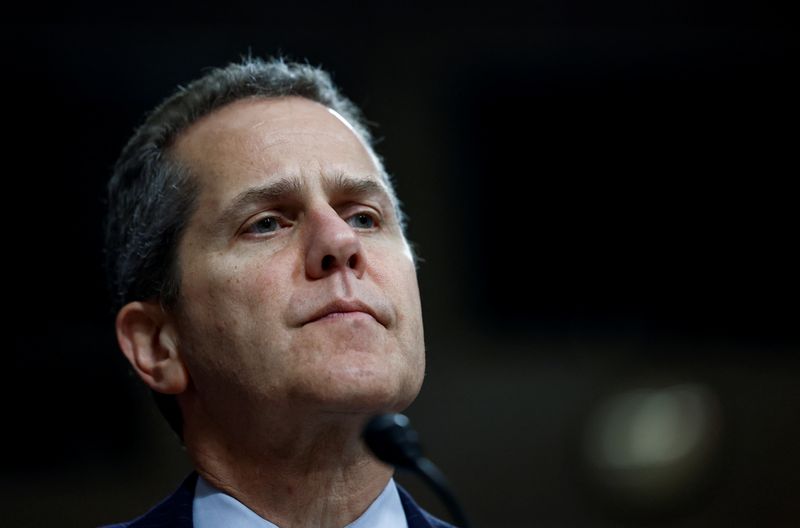By Pete Schroeder
WASHINGTON (Reuters) -Michael Barr, the Federal Reserve’s top regulatory cop, said on Monday he will leave that post on Feb. 28, avoiding a potentially messy legal fight with President-elect Donald Trump who is now free to replace him with an industry-friendly pick.
Barr said in a statement he was stepping down from his role as the central bank’s vice chair for supervision over a year before his term expires, but planned to keep his seat on the Fed’s Board of Governors.
The central bank said in the statement it would take up no major rulemaking until a successor to the regulatory role is confirmed. Barr’s exit clears the way for Trump, who will be sworn in on Jan. 20, to appoint all new bank regulators for the U.S. government and begin work on a more industry-friendly agenda.
Barr’s term was not set to expire until July 2026, and he had previously told Congress he intended to remain in the position.
While not naming Trump, Barr said in a statement the “risk of a dispute” over his job could be a “distraction” from the Fed’s mission. Reuters had previously reported that Barr, a Democrat, had sought legal advice from an outside law firm to explore his options should Trump try to remove him. The Washington Post reported in October that Trump officials were exploring stripping Barr of his regulatory role.
Barr’s decision to remain as a Fed governor, however, limits Trump’s options for naming a successor. There are no open seats on the Fed’s seven-member board until 2026, meaning he would either need to select a new regulatory chief from the existing ranks, or move one of those officials to a separate post elsewhere in government to free up a spot.
“This is less of a victory for the big banks than it may appear. Democrats will retain their majority on the Federal Reserve Board until early 2026. And it is hard for us to see much getting done on the deregulatory side this year given the need to confirm new regulators,” said Jaret Seiberg, managing director at TD Cowen, in a note.
Fed Governor Michelle Bowman, who has been regularly critical of Barr’s efforts to impose tougher rules on the banking sector, is widely seen by lobbyists and analysts as a candidate to replace him. Christopher Waller, another Fed governor nominated by Trump in his first term, is viewed as another potential candidate by industry officials.
Tapped by President Joe Biden, Barr pursued an aggressive agenda in an effort to impose a range of stricter rules on the nation’s biggest banks. The banking industry intensely lobbied against his efforts and threatened to sue over a proposed rule that would have hiked big bank capital.
That effort to impose tough new risk gauges on big banks via the so-called “Basel III Endgame” was weakened following fierce industry opposition, only to fail to advance amid disagreement among bank regulators on the proper course. With Barr no longer in the post, that rule could be shelved entirely.
Shares of major U.S. banks jumped in late-morning trading after the news with Citigroup (NYSE:C) leading with a near 4% jump, followed by Bank of America, Morgan Stanley (NYSE:MS) and Wells Fargo (NYSE:WFC), which rose between 2% and 3%. The broader S&P 500 Banks Index, which tracks large-cap U.S. lenders, was last up 1.5% in late-morning trading. An index tracking regional banks traded 2% higher.
Barr’s exit also comes following reports that Trump’s advisers were looking for ways to increase the incoming White House’s sway over the Fed, alarming officials and investors who argue that the central bank’s independence is necessary for it to be able to properly set monetary policy.
A spokesperson for Trump’s transition did not immediately respond to a request for comment.
Fed Chair Jerome Powell, who was appointed to his role as central bank chief by Trump only to be subsequently criticized for his decisions on interest rates, was seen as a target of the incoming president. But Powell said after the Nov. 5 presidential election that Trump would not have the authority to remove him. Trump subsequently said he does not intend to remove Powell.
The law establishing the Fed says the president is only allowed to fire Fed governors for cause, but it is silent on whether Trump would have the power to demote Barr from his role as vice chair for supervision. Powell has previously said demoting Fed officials is not permitted under the law.

